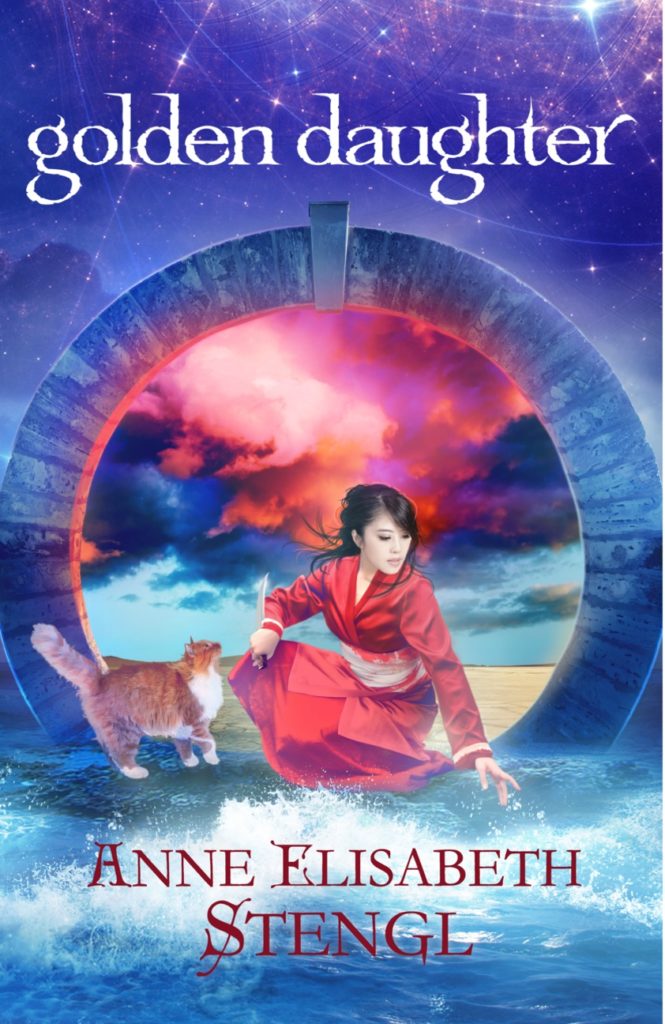‘Golden Daughter’ Is An Exotic, Emotional Epic From Goldstone Woods
Do not be fooled by the colorful, sparkly cover. Golden Daughter is one of the most epic novels of Christian fantasy.
The story is mainly based in the Noorhitam Empire, a very Oriental-inspired culture, which is so refreshing to find in a genre dominated by European settings. Anne Elisabeth Stengl brings this world to brilliant life, from the palace to the academy to the markets to the leper colonies.
Here we find two main castes: the aristocratic Kitar and the brooding natives, the Chhayans. A long-simmering feud between them in beginning to stir; a plan long in construction is at last being brought to light. The barbaric chieftains of the Chhayans seek a dark alliance, venturing into a perilous world. The Kitar priests seek to protect their greatest protect protégé whilst trying to interpret their emperor’s disturbing dream. The Crouching Shadows, infamous as assassins, seek to prevent disaster to their goddess by any means necessary. And the Golden Daughters demurely watch, waiting, waiting, for the slightest sign of danger.
War is approaching.
Dreams are coming true.
And the End awaits.
At first, any newcomers into Goldstone Wood might be surprised to find out Golden Daughter is “Christian” fantasy. After all, most of the characters and the very culture dedicates itself to their goddess, the moon. And while some perform their rituals with hypocritical ease, others carry out their dedication with disturbing loyalty. Unlike most Christian fantasy, this doesn’t take the point of view of the “Christian” character.
This is the real world. Not to say that is actually exists, but because the foundation of it is true. A corrupt world. Fallen. Deceived. As such, there is false religion, and people devoted and aloof to it. There is an awareness of the more lewd sides of the world that adds a certain maturity that wasn’t so present in other Goldstone novels. It shows us that men’s attempts to connect with spiritual worlds without God’s summoning leads to damaging consequences.
Where is God in a world like this? Where is he when darkness falls? This book takes us by the hand, and guides us through the lies, shows the fragility of the promises of the world, and brings us to a profound and beautiful portrayal of God’s character and ultimate power.
Actually, the story does turn out to parallel a familiar Bible account. But perhaps because it is so obvious, we overlook it, because I never recognized it until thinking later about the story.
This is definitely the most violent of the Tales so far. Golden Daughter is not as graphic or disturbing as it could be, but it still packs some punch. The Dragon is truly a terrible villain, and some of his actions shown here are more horrific (in the literal sense of the word) than we’ve seen before. A war is brewing, and (spoiler) a war explodes into action. It might be a bit too harsh for the very sensitive reader. The headcount by the end is rather high … and Anne Elisabeth has this way of making you feel each death, even with the people you didn’t care for (or even know).
That is another of her gifts. Creating real people, so real some people have trouble liking them. True to life, learning about these people is painful as we see their strengths and sins revealed. I’ve never gone back and forth on my opinion on so many characters.
But there is no question of loving the main character, Sairu.
Is there another character anywhere that is like Sairu? So charming, so cunning. So delightful, so deadly? She is a cheerful girl brought up to one of the most terrifying protectors of her country. Despite her lethal skill, she is relatively innocent, having been cloistered inside the palace until her first assignment. Nonetheless, she is not intimidated. She takes the world head on, never mind those who oh-so-foolishly doubt her. Yet for all her strengths, she is a captive, bound to the restrictions of her order and the honor of her mission. And though she does not know it, these things could destroy her.
Along comes Eanrin, of course. By now in the series, the book really isn’t started until that faerie strolls in. Infamous for his witty tongue, vanity, and dashing good looks, Eanrin discovers he might have met his match in the strange little mortal, Sairu. Their exchanges throughout the book have to be some of the best.
Jovann, a prince betrayed and enslaved by a people he has been reared to despise, may be the only one who can save the land or usher in its destruction. Sunan (yes, the Sunan from Veiled Rose), cheated of greatness due to his mixed blood, finds himself a pawn in a deadly game.
Lady Hariawan … ah, but Hariawan is impossible to like. And that’s all right. It was on purpose. We have hints that she might once have been something great, or at least impressive. But her soul has bled away in her dangerous dream-walking. Now … now she is nearly nothing. Consumed. But I shan’t say more, for fear of spoiling.
I could go on and on about how wonderful this series is, and about how anyone who despairs of quality high fantasy that’s clean with Christian themes need only turn to to these books.
I feel like this review hardly does it justice. But perhaps I’ve made my point anyway.
Golden Daughter is so unique from the rest of the Tales of Goldstone Woods series. The tale has an almost entirely new cast and setting, and any reader could jump in without great confusion. Reading the rest of the series first is highly suggested. But it will not stop you from enjoying this exotic epic of love, betrayal, and the glory of God.





































Great review! I agree, it’s a magnificent book.
Thanks. I’m looking forward to reading <i>Golden Daughter</i>.